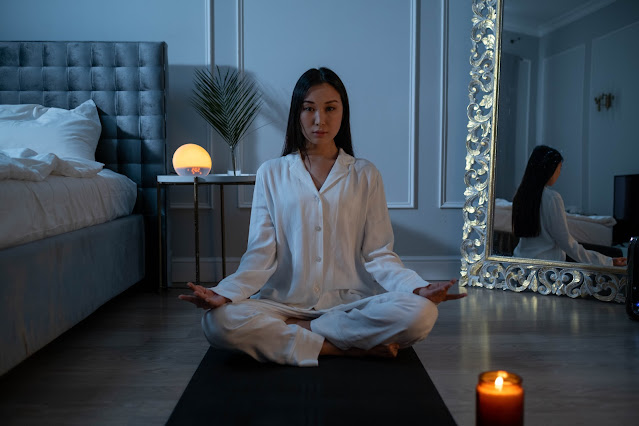In today's fast-paced and demanding world, finding moments of tranquility and inner peace is more important than ever. Meditation, an ancient practice that has stood the test of time, offers a multitude of health benefits for both the mind and body. By incorporating meditation into your daily life, you can experience improved mental well-being, enhanced focus, reduced stress levels, and a greater sense of serenity. In this article, we will explore the remarkable advantages of meditation and provide you with practical tips to seamlessly integrate this practice into your busy schedule.
1. Understanding the Health Benefits of Meditation:
Meditation is often associated with relaxation and stress reduction, but its benefits extend far beyond these aspects. Scientific research has shown that regular meditation practice can positively impact various areas of our health, including:
a. Stress Management: Meditation activates the body's relaxation response, reducing the production of stress hormones such as cortisol. It helps alleviate anxiety and cultivates a sense of calm.
b. Enhanced Mental Well-being: Regular meditation practice has been linked to improved focus, attention, and memory. It helps reduce symptoms of depression and promotes emotional stability.
c. Physical Health: Studies have shown that meditation can lower blood pressure, strengthen the immune system, and alleviate chronic pain. It also supports a healthier heart and respiratory system.
d. Increased Self-Awareness: Through mindfulness meditation, individuals gain a deeper understanding of their thoughts, emotions, and behaviors. This self-awareness fosters personal growth and self-acceptance.
2. Simple Techniques to Incorporate Meditation into Daily Life:
Integrating meditation into your daily routine doesn't have to be time-consuming or complicated. With a few simple adjustments, you can make space for meditation and enjoy its benefits. Here are some practical ways to incorporate meditation into your daily life:
a. Morning Meditation: Begin your day with a few minutes of meditation. Set aside a quiet space where you can sit comfortably, close your eyes, and focus on your breath. Start with just five minutes and gradually increase the duration over time.
b. Mindful Breaks: Take short breaks throughout the day to center yourself and reconnect with the present moment. Use these moments to practice mindful breathing or a brief guided meditation.
c. Walking Meditation: Incorporate meditation into your daily walk or commute. Pay attention to the sensations of each step, the rhythm of your breath, and the sights and sounds around you.
d. Before Bedtime: Wind down at the end of the day with a calming meditation practice. This can involve deep breathing, progressive muscle relaxation, or listening to a guided meditation specifically designed for sleep.
e. Meditation Apps and Resources: Utilize technology to support your meditation practice. There are numerous meditation apps available that offer guided sessions, timers, and soothing music to enhance your experience.
3. Overcoming Challenges and Maintaining Consistency:
While incorporating meditation into daily life may seem straightforward, staying consistent can be challenging. To overcome obstacles and maintain a regular practice, consider the following tips:
a. Start Small: Begin with short meditation sessions and gradually increase the duration. Consistency is more important than duration when starting out.
b. Create a Sacred Space: Designate a specific area in your home for meditation. It could be a corner of a room or a dedicated meditation space. Make it comfortable and free from distractions. Add elements that promote relaxation, such as cushions, candles, or plants.
c. Set a Schedule: Establish a regular meditation schedule that works for you. Whether it's early morning, during a lunch break, or before bedtime, having a set time each day helps create a routine.
d. Be Flexible: While consistency is important, it's also essential to be flexible and adapt to your daily schedule. If you miss a session, don't beat yourself up. Just get back to your practice the next day.
e. Find a Meditation Style that Resonates: There are various meditation techniques to explore, such as mindfulness, loving-kindness, or transcendental meditation. Experiment with different styles and find the one that resonates with you the most.
f. Seek Support: Join a meditation group or community to connect with like-minded individuals. Sharing experiences and insights can provide motivation and accountability.
g. Patience and Persistence: Like any skill, meditation takes time to develop. Be patient with yourself and understand that it's a journey. Even if you experience challenges or distractions during your practice, keep going.
Incorporating meditation into your daily life can have profound effects on your overall well-being. By embracing this ancient practice, you can experience improved mental clarity, reduced stress levels, and a greater sense of peace and serenity. Remember, meditation doesn't have to be complicated or time-consuming. With a few simple adjustments and a commitment to consistency, you can unlock the numerous health benefits of meditation and create a more balanced and fulfilling life.
By prioritizing self-care and dedicating even a few minutes each day to meditation, you'll cultivate a deeper connection with yourself, manage stress more effectively, and navigate life's challenges with greater resilience. So, take a deep breath, find your stillness, and embark on a journey of self-discovery and inner peace through the practice of meditation.




If you have any kind of views, doubts, reviews or thoughts do let me know. Thank you.